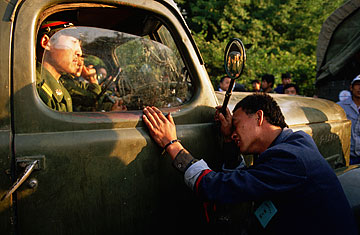
A weary protester pleads with a PLA officer to halt the crackdown
(2 of 3)
In the coming days, Tiananmen Square filled with protesters. They were orderly, peaceful, impassioned, convinced that they needed to speak up for the nation. CNN had set up its facilities to broadcast from the square, and the world tuned in nightly to this intoxicating drama. I remember a white-collar worker who approached me, thrilled to meet a foreign journalist. "Tell the world that the Chinese people want democracy," he said. Like millions of others around the country, he had been moved by the student movement and had joined the marches. My wife, too, experienced the remarkable spirit of that moment. In the first large protests, when students feared they might be stopped with violence, she was in the thick of things. As students pushed through the police cordons, groups of Chinese would lock arms around her to make sure she and our unborn child got through safely. Grannies threw plastic sacks of milk to her from the sidelines. "Please tell our story!" they would shout.
In early May, Dinda flew to Hong Kong to prepare to have the baby. I stayed in Beijing reporting day and night on the protests. On May 23, while I was working late in the office, she called to say she had gone into labor. I flew into action. Yes, I was covering the story of a lifetime. But I was also about to become a father for the first time.
I rushed to Beijing's airport and ditched my car in the parking lot. The airport was jammed with foreigners trying to get out of town. Despite my desperate pleas, no one would give me their ticket. I finally begged a sales agent and got on the next flight to Hong Kong. It made an unannounced stop in Tianjin; a stewardess explained that this was so the pilots could have breakfast. I was dying. This was before the era of cell phones, so I had no way to reach my wife. Finally we landed in Hong Kong. I cut in front of everyone at customs, immigration and taxi lines and told my cab driver to take me to Matilda Hospital on the Peak. He started driving but then stopped, saying he didn't know the way. I was dumped in a crowded commercial district in Kowloon and had to flag another cab. This one took me to the Matilda. As we drove up the front drive, a nurse emerged. "You must be Mr. Ignatius. Come with me." We ran upstairs to the delivery room. The doctor had given up on me and was finally telling my wife it was time. "Push," he instructed, just as I entered the room. Within minutes, Oliver was born.
Pawns in a Power Struggle
Twelve days later, on June 4, the Tiananmen massacre took place. I was still in Hong Kong. While I regret not being in Beijing to bear witness to the tragedy, my absence in a sense helps expose as untrue China's official explanation for its violent response. For by early June the movement was starting to flag. Many foreign journalists decided then to finally take long-overdue R&R breaks after weeks of intense coverage. The Beijing-based students had largely returned to their campuses. And while a flow of students was still arriving from outside the capital, the protests were losing their momentum.
The fact is, the students had become pawns in a power struggle at the pinnacle of the Party. The hard-line faction within China's leadership had taken control and had the army at the ready. On May 19, these men had voted to declare martial law. Zhao Ziyang, an economic reformer who had replaced Hu as Party leader in 1987, had refused to sign off on the plan and was ousted. The only question was when and how the assault would take place. I suspect the hard-liners wanted to crack down so defiantly that they would wipe away not only the protesters but also the liberal political ideas that were beginning to take root.
The Party's official line is that it put down a rebellion, just as any right-minded government would do. The reality was different. The protesters still on the square were orderly and, as their numbers dwindled, on the verge of becoming irrelevant. But on June 2, the Party without warning sent thousands of troops rushing in toward the center of the city. Unarmed, they accomplished only one thing: ensuring that much of Beijing took to the streets again in agitated concern.